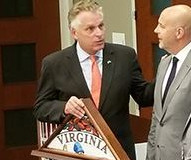7/23/2019
Federal Appeals Court Rejects Fraud Suit Against Green Car CompanyChinese investors lose bid to recover millions poured into failed electric car company after Fourth Circuit US Court of Appeals ruling.

A failed "green" car company run by the former governor of Virginia will not be held accountable for untrue statements made to lure Chinese investors. The Fourth Circuit US Court of Appeals in a decision revised last Wednesday found no evidence that a handful of wealthy foreign investors poured millions into GreenTech Automotive based on the specific, and false, claims of company founder Terry McAuliffe, the former Democratic governor, and Tony Rodham, his partner and the brother of Hillary Clinton. The appellate panel, which consisted entirely of judges appointed by Republican presidents, granted McAuliffe's motion to dismiss.
McAuliffe's plan was to use money from the EB-5 immigration visa program to fund his car company. Each Chinese investor would pay $500,000 and receive a green card. GreenTech's product was supposed to be MyCar, a low-speed electric vehicle subject to only the limited federal regulations governing golf carts. A factory in Mississippi was to build the 7 horsepower vehicle which would then be sold for $15,000 as a "neighborhood vehicle." Few were ever built, despite the $43 million raised from 86 Chinese nationals seeking US citizenship.
Twenty-seven of those investors sued McAuliffe and Rodham, who died last month, claiming they were misled by Rodham's false claim that the visa-for-citizenship funding only accounted for 7.8 percent of GreenTech's capital. They were also upset over McAuliffe's claim on CNBC that he had sold 11,000 cars and that he had a contract to sell vehicles in Denmark. GreenTech defaulted and went bankrupt, and the investors have been unable to recover their $500,000. The three-judge panel was not persuaded by the investors' complaint, despite the evidence of fraud they presented.
"Puffery, too, serves an important role in the formation of contracts large and small," Judge J. Harvie Wilkinson III wrote for the court. "There is little doubt that expressions of enthusiasm and use of superlatives are common tools for skilled salespersons... The problem for defendants, however, is that their alleged misstatements go beyond mere projections or puffery."
The problem for the Chinese investors is that their lawyer failed to prove specifically how they saw and relied upon those false claims.
"Most of the alleged misstatements, for example, were made in English -- a language that many of the plaintiffs allege they do not understand," Judge Wilkinson explained. "What is more, many of those alleged misstatements were made to American media, sometimes of the local variety. It is far from clear how or whether plaintiffs learned of these statements."
More importantly, the court noted, the actual documents signed by the investors outlined the risks in detail.
"While everyone occasionally skips over the fine print in their day-to-day endeavors, it is fair to expect some minimal level of due diligence before making this large an investment in a company whose prospects were chancy and where sizeable returns were anything but guaranteed," Judge Wilkinson concluded.
A copy of the ruling is available in a 100k PDF file at the source link below.


